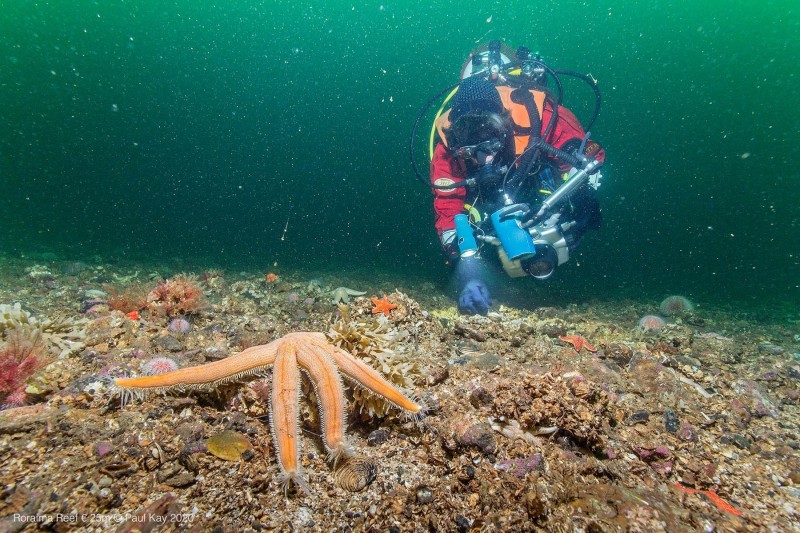Collecting flame shells (Limaria hians) in Scotland
Danielle Sloan
School of Biological Sciences, University of Aberdeen

Image 1: COAST MPA Project Officer, Lucy Kay, examining the surface of the South Arran MPA flame shell bed for flame shells. (Photo credits: © Paul Kay)
When I began my PhD in October 2019, I anticipated the usual challenges - moving to a new city, dealing with administrative bureaucracy, developing working relationships with colleagues and supervisors, deep diving into new subject areas. However, I had no clue that we were only months away from the start of a global pandemic. Within months of starting, my research plans were thrown out of the window as international borders closed and government lockdowns and restrictions rolled out, all with no end in sight.
After several months of interruptions and delays to my research and training, an exciting opportunity arose to participate in a two-week intensive in-person Next Generation Sequencing (NGS) training course at Nord University (Norway). Complementary to this, an opportunity to conduct fieldwork to answer crucial questions about the reproductive biology of my study species - the flame shell, Limaria hians - in Norway also arose. I was incredibly lucky that several societies, including the Challenger Society, wanted to support my participation in these activities and I am grateful to them all for that support.
However, as with many plans made during the pandemic, things didn’t go as expected. A week before I was due to travel to Norway, the Norwegian government made the decision to keep their borders closed. So, it was back to the drawing board to come up with another plan.
We reached out to the Community of Arran Seabed trust (COAST), with whom we had previously worked with to collect specimens for use in my genetic research into the connectivity of Scottish flame shell beds, to ask if they would be able to assist. After a few meetings with their project coordinator, Lucy Kay, and co-founder, Howard Wood OBE, to hash out the logistics, COAST agreed to volunteer their time, dive skills and boat to collecting monthly samples for my research.
Image 2: An exposed flame shell on the surface of the flame shell bed. (Photo credits: © Lucy Kay)
Since March 2022 we have had 5 successful sampling trips, with plans for more over the next few months. With every trip, I learn more about flame shells, not only through the collected samples, but also through speaking with the divers who are able to see these incredible animals in their natural environment. I have also had the chance to learn more about the South Arran MPA and the Lamlash Bay No Take Zone (NTZ) which was the first community-led marine reserve of its kind in Scotland when it was established in 2008. Furthermore, the entire experience of having to change and adapt plans at later stages has made me more resilient as a researcher.
COAST have been integral to my research into the reproductive biology of flame shells, and I want to thank every member who has dedicated their time and energy to further our knowledge of this species. Finally, I would like to thank the Challenger Society once again for its support in partially funding this fieldwork.
Profile
Danielle is a PhD researcher at the University of Aberdeen working in collaboration with Marine Scotland Science. She is funded by the Scottish Universities Partnership for Environmental Research (SUPER) Doctoral Training Partnership (DTP), the University of Aberdeen and Marine Scotland Science.
Using bio-physical modelling and population genetics in a multi-disciplinary approach, Danielle is investigating the connectivity of Scottish flame shell (Limaria hians) populations. She has previously researched flapper skate (Dipturus intermedia) population distributions in the Loch Sunart to the Sound of Jura MPA for her Master of Science (MSci) thesis in addition to volunteering at Bimini Biological Field Station.
https://www.abdn.ac.uk/people/d.sloan.19
Latest News
Royal Society Publishing Photography Competition 2025
Please see a message from the Royal Society below:
We are delighted to announce that the 2025 Competition is now open for entries until 15 August for a chance to win £1000! The competition celebrates the power of photography in conveying the wonder of science happening all around us and photographs can be submitted in the categories of: Astronomy, Behaviour, Earth Science and Climatology, Ecology and Environmental Science, and Microimaging.
The competition is free to enter and open to anyone studying or working in science at graduate level or above. Category winners will receive a one-year membership to the Royal Photographic Society and the overall winner will receive a grand prize of £1,000. Find out more: https://bit.ly/RSPphotocomp
October 2025 MEDIN Workshop: Marine Data Management, Governance and the MEDIN toolset
The Marine Environmental Data and Information Network (MEDIN) are pleased to announce that registration is now open for the next occurrence of our popular free online training workshop: ‘Marine Data Management, Governance and the MEDIN toolset’ on the 13th – 17th October 2025 on OceanTeacher Global Academy.
Marine Data Management, Governance and the MEDIN toolset
The Marine Environmental Data and Information Network (MEDIN) and OceanWise are delighted to invite you to attend our popular free online training workshop: ‘Marine Data Management, Governance and the MEDIN toolset’ on the 19th – 23rd of May 2025.
